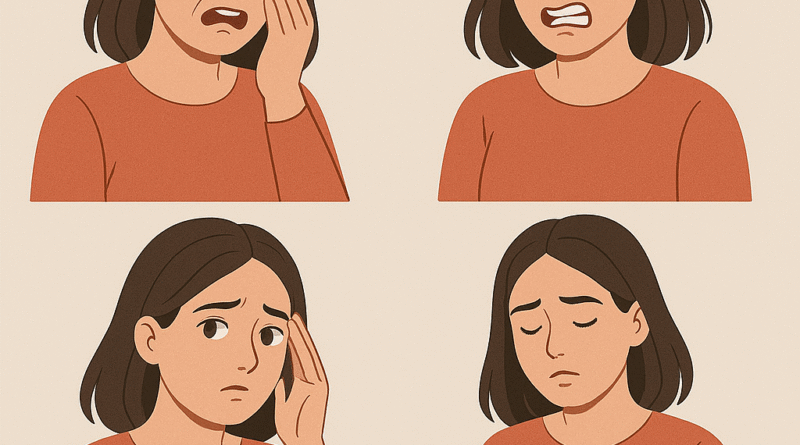Feeling Tired, Moody & Stressed? It Could Be Hormonal Imbalance | 10 Warning Signs You Should Never Ignore.
Hormonal Imbalance in Women: Signs You Shouldn’t Ignore
The Story That Might Sound Familiar
Riya, a 32-year-old working mom, often felt exhausted even after a full night’s sleep. She brushed it off as “just being busy.” Slowly, she noticed sudden mood swings, unexplained weight gain around her belly, irregular periods, and constant acne breakouts that reminded her of her teenage years. Her hair was thinning, and no matter how much she dieted or exercised, nothing seemed to change.
At first, she thought it was just stress. But after months of struggle, she finally consulted a doctor — only to learn that she was suffering from hormonal imbalance.
This story isn’t unique. Millions of women go through similar struggles, ignoring or misunderstanding their symptoms. The truth is, hormones control almost every function of our body — from mood, energy, and sleep to fertility, metabolism, and even skin health. When they go out of balance, it can silently affect physical and emotional well-being.
So, how do you know if your body is trying to warn you? Let’s dive deeper.

Why Hormonal Balance Matters So Much
Hormones are chemical messengers that regulate vital processes like:
- Metabolism – how your body converts food into energy
- Reproductive health – menstrual cycle, fertility, pregnancy, and menopause
- Mood and brain health – stress response, emotions, focus, and memory
- Sleep cycle – melatonin and cortisol levels
- Skin and hair health – sebum production, collagen, and hair growth
When even one hormone goes out of balance — whether it’s estrogen, progesterone, thyroid hormones, insulin, or cortisol — the ripple effect can disturb multiple systems. Unfortunately, women often dismiss these symptoms as “normal” or “just stress,” delaying diagnosis and treatment.
Common Causes of Hormonal Imbalance in Women
Before we get into the signs, let’s understand what causes this imbalance:
- Stress – Chronic stress raises cortisol, disturbing reproductive hormones.
- Poor diet – High sugar, junk food, and processed carbs spike insulin and affect estrogen balance.
- Lack of sleep – Disturbs melatonin, growth hormones, and cortisol cycles.
- Polycystic Ovary Syndrome (PCOS) – A common condition leading to excess androgens.
- Thyroid disorders – Hypothyroidism or hyperthyroidism impact metabolism and mood.
- Perimenopause and menopause – Natural decline in estrogen and progesterone.
- Medications or contraceptives – Can alter hormone levels.
- Environmental toxins – Plastics, chemicals, and pesticides can mimic hormones in the body.
Signs of Hormonal Imbalance You Shouldn’t Ignore.
- Irregular Periods
Missing periods, extremely heavy flow, or cycles that come too early or too late can signal imbalances in estrogen and progesterone. This could indicate PCOS, thyroid issues, or even early menopause.
- Unexplained Weight Gain or Difficulty Losing Weight
If you’re eating healthy and exercising but still gaining weight, hormones like insulin, cortisol, or thyroid hormones may be out of balance. Many women notice stubborn belly fat despite strict diets.
- Constant Fatigue and Low Energy
Feeling drained even after 8 hours of sleep could point to thyroid disorders, adrenal fatigue, or low progesterone. It’s one of the most ignored signs because many women assume tiredness is normal.
- Mood Swings, Anxiety, or Depression
Hormones like estrogen, progesterone, and cortisol directly influence brain chemistry. Fluctuations can cause mood swings, irritability, anxiety, or even depression. Many women confuse it with “just PMS,” but it may indicate a deeper imbalance.
- Acne and Skin Problems
Adult acne, oily skin, or sudden breakouts often signal excess androgens (male hormones) or insulin resistance. Dry skin or premature wrinkles may point toward thyroid imbalance or low estrogen.
- Hair Loss or Excessive Hair Growth
Thinning hair on the scalp, or sudden hair growth on the face and body, can be linked to androgen imbalance or PCOS.
- Trouble Sleeping or Insomnia
Low progesterone and high cortisol disturb sleep cycles. Women in perimenopause and menopause often complain of hot flashes, night sweats, and disturbed sleep.
- Low Libido
A decline in sex drive may be caused by low estrogen, low testosterone, or high stress hormones. Many women don’t talk about it, but it’s a very real symptom of hormonal imbalance.
- Digestive Issues
Bloating, constipation, or diarrhea can be triggered by hormonal fluctuations since estrogen and progesterone affect digestion and gut health.
- Fertility Struggles
Difficulty conceiving may be linked to ovulation issues, thyroid imbalance, or PCOS. Ignoring irregular cycles or abnormal periods can delay getting the right help.
When to See a Doctor
If you experience multiple symptoms consistently for weeks or months, don’t ignore them. Consult a gynecologist or endocrinologist. Blood tests, ultrasound, or thyroid tests can confirm imbalances.
Natural Ways to Support Hormonal Balance
While medical guidance is essential, lifestyle changes can make a big difference:
- Balanced diet – Eat whole grains, lean protein, fruits, and vegetables. Avoid refined sugar and processed foods.
- Exercise regularly – Even 30 minutes of walking or yoga helps regulate insulin and cortisol.
- Get enough sleep – Aim for 7–8 hours of quality rest.
- Stress management – Meditation, deep breathing, and hobbies reduce cortisol.
- Avoid endocrine disruptors – Limit plastic use, switch to glass/steel, and choose chemical-free skincare.
- Herbal support – Ashwagandha, flaxseeds, and omega-3 may help in regulating hormones.
- Stay hydrated – Water helps flush toxins and supports metabolism.
The Hidden Danger of Ignoring Hormonal Imbalance
If left untreated, hormonal imbalance can lead to:
- Infertility
- Osteoporosis
- Diabetes
- Heart disease
- Severe mental health issues
That’s why paying attention to your body’s signals is crucial.
Final Thoughts
Like Riya’s story, many women ignore hormonal imbalance signs until it affects their health and happiness in a big way. Remember: your body whispers before it screams. If you notice unusual changes — irregular periods, fatigue, mood swings, hair loss, or skin problems — don’t dismiss them.
Hormonal health is the foundation of overall well-being. By listening to your body, seeking timely medical help, and making small lifestyle changes, you can restore balance and live with more energy, confidence, and peace.
VIRAL, THEREVIEWSPACEDOTIN, THE REVIEW SPACE, REVIEW, TRENDING, BLOGS, US BLOG, current, Discover, google discover, hormonal imbalance in women, signs of hormonal imbalance, hormonal imbalance weight gain, irregular periods hormonal imbalance, fatigue due to hormonal imbalance, mood swings hormonal imbalance, hormonal imbalance skin problems, hormonal imbalance in women, signs of hormonal imbalance, weight gain, irregular periods, fatigue, mood swings, skin problems, hair loss,fertility, sleep problems, women health issues, female hormonal imbalance symptoms, hormonal imbalance treatment, hormonal imbalance diet, thyroid, hormonal imbalance causes, PCOS and hormonal imbalance, stress and hormones, natural remedies for hormonal imbalance, women wellness blog, health tips for women
